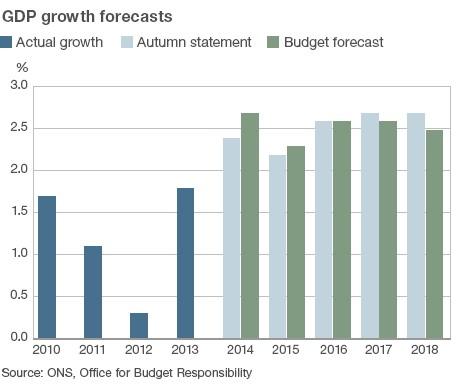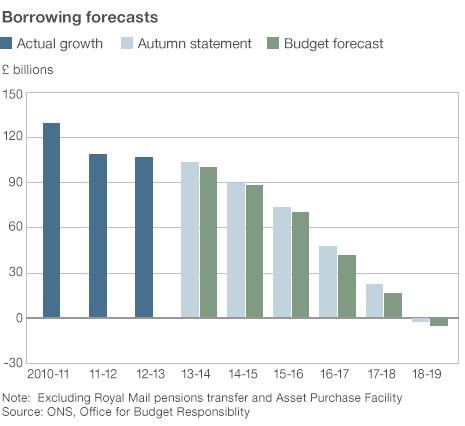Budget 2014: Growth forecasts raised for 2014 and 2015
- Published

Official forecasts for UK economic growth have been raised for the next two years but cut for later years.
The predictions from the Office for Budget Responsibility, external (OBR) show that gross domestic product (GDP) is expected to rise by 2.7% in 2014, up from a forecast of 2.4% in December.
The growth forecast for 2015 has been raised from 2.2% to 2.3% and 2016 has been left unchanged at 2.6%.
The 2017 rate fell from 2.7% to 2.6%. The 2018 rate fell from 2.7% to 2.5%.
Chancellor George Osborne announced the forecasts in the Budget speech, in which he said the economy was, "continuing to recover and recovering faster than forecast".
The OBR warned of possible risks that could threaten its growth forecasts. In particular, it said that escalation of the situation in Ukraine "risks lower growth".
But the near-term forecasts being raised while the more distant ones are cut suggests that the OBR thinks the spare capacity in the economy is being used up faster than it expected.
Minutes, external from the interest rate-setting Monetary Policy Committee meeting at the beginning of the month, which were published earlier on Wednesday, expressed the uncertainty about the amount of spare capacity the economy has.

The OBR's forecasts for government borrowing were cut from the levels predicted at the time of the Autumn Statement in December.
It is expecting the government to borrow £108bn in the current financial year (which ends at the start of April) having previously predicted £111bn.
Next year's forecast has been cut from £96bn to £95bn.
The surplus prediction for 2018-19 has been raised from £2bn to £5bn.
Mr Osborne said that despite improvements, the country was still borrowing too much and not saving, investing or exporting enough.
He also said that the OBR had predicted that the output of the economy would return later this year to the peak seen before the financial crisis in 2007-08.
It also forecast that earnings would rise faster than prices from this year.
Figures released by the Office for National Statistics earlier on Wednesday showed that the UK's unemployment rate stood at 7.2% in the three months to the end of January.
The OBR predicts that the rate will fall to 6.8% by the end of the year, and will decline gradually to 5.4% by 2018.
Uncertainties
Labour leader Ed Miliband said it was strange that the chancellor expected people to be "grateful" that he could achieve a government surplus by 2018, when he had previously promised to manage that by 2014-15.
He also criticised the level of growth in the economy.
"Back in 2010 you told us that at the end of 2014 the economy would have grown by nearly 12%," he said.
"Today the figures say it's been barely half that, and you want the country to be grateful."
The OBR emphasised the uncertainties around its economic forecasts, with concern about the weakness of productivity, real wages and the falling savings ratio.
It also warned that household debt was approaching its pre-crisis levels, and that this may threaten the sustainability of the economy.
And the OBR added that the improvements to the economy were "cyclical rather than structural".
Sarah Hewin, senior economist at Standard Chartered, told the BBC: "The outlook for the UK economy still has a question mark over it," adding that the City was still waiting for news of further deficit-cutting measures.